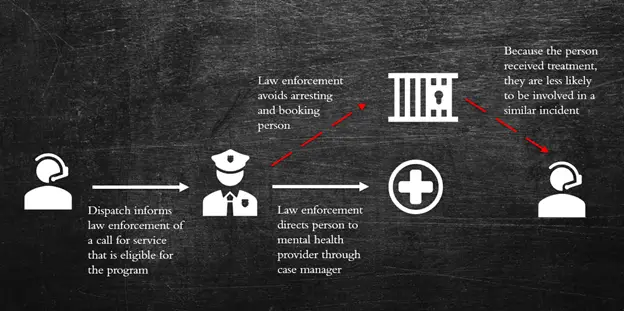A program to divert people who come to the attention of law enforcement because of a mental health crisis from jail to mental health treatment
Mental health crises can come on suddenly and threaten the safety of the person experiencing the crisis and those around them. When law enforcement officers are called to intervene, the encounters often result in the person with mental health problems being arrested for minor offenses. This burdens the criminal justice system and fails to provide the person with adequate treatment.
Pre-arrest diversion programs provide an alternative outcome. Designed to reduce the number of persons who are arrested and placed in jail because of a mental health problem, these programs shift responsibility for rehabilitation from the criminal justice system to the mental health system. Instead of punishment, pre-arrest diversion steers people toward treatment and support for their mental health problems.
This is an important outcome for the person in crisis, the public, and the criminal justice system. Jail is an inadequate setting for the provision of mental health treatment and can intensify symptoms of mental distress. Without adequate care, mental health crises can reoccur and put the individual and the public at risk. Additionally, police and correctional officers do not receive adequate training to manage individuals experiencing mental health crises and report this aspect of the job as an especially stressful one.
Communities Are Increasingly Adopting Pre-Arrest Diversion Programs
Communities across the United States are increasingly adopting pre-arrest diversion programs. Importantly, these programs can take many forms, and research has not yet shown how effective they are at improving the quality of mental health treatment or reducing the number of repeat encounters with law enforcement. To build on this research, in 2019 RTI partnered with law enforcement agencies, mental health providers, and case managers in Lafayette Parish, Louisiana, to develop and evaluate a pre-arrest diversion program for people experiencing a mental health crisis who come into contact with law enforcement.
The program we developed applies our expertise in policing research, public health, and program design. We are now conducting a methodologically rigorous outcome evaluation to test whether the program is effective at increasing the number of mental health services these individuals receive and reducing the number of calls for service to law enforcement that are based on a person experiencing a mental health crisis. The pre-arrest diversion program involves multiple processes that unite law enforcement, case managers, and mental health providers to address the mental health needs of Lafayette Parish residents.

The solid white arrows link components of the pre-arrest diversion program, while the broken red arrows show how the working group is avoiding undesirable outcomes of the traditional method of responding to calls for service that involve a person in mental health crisis. The key differences between the program’s intended outcomes and the traditional method’s outcomes involve 1) the arrow linking law enforcement to mental health providers and 2) the lack of an arrow linking mental health providers to law enforcement dispatchers. These links represent the program’s desired outcomes for each participant: expand the quantity and quality of mental health treatment and decrease the frequency of future contacts with law enforcement.
Our ongoing outcome evaluation will measure this program’s effectiveness for the people of Lafayette Parish.
Some measures of our pre-arrest diversion program’s success include:
- More mental health services provided to eligible subjects
- Fewer people ending up in jail after mental health crises
- A lower proportion of law enforcement calls for service based on mental health crises
People in mental health crises, their families, and law enforcement officers themselves could all benefit from an improved system that emphasizes treatment rather than arrest. Lessons learned from the Lafayette Parish pre-arrest diversion program will help other communities with similar efforts. RTI looks forward to being part of the solution to this longstanding, widespread problem.
- Lafayette Parish (Louisiana) Sheriff's Office

